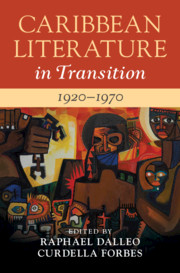Book contents
- Caribbean Literature in Transition, 1920–1970
- Caribbean Literature in Transition
- Caribbean Literature in Transition, 1920–1970
- Copyright page
- Contents
- Figure
- Contributors
- Introduction
- Part I Literary and Generic Transitions
- Chapter 1 Writing at the End of Empire
- Chapter 2 Questioning Modernism
- Chapter 3 Daily Decolonization
- Chapter 4 Towards a National Theatre
- Chapter 5 Orature, Performance, and the Oral–Scribal Interface
- Chapter 6 Explorations of the Self
- Part II Cultural and Political Transitions
- Part III The Caribbean Region in Transition
- Part IV Critical Transitions
- Bibliography
- Index
Chapter 4 - Towards a National Theatre
from Part I - Literary and Generic Transitions
Published online by Cambridge University Press: 16 December 2020
- Caribbean Literature in Transition, 1920–1970
- Caribbean Literature in Transition
- Caribbean Literature in Transition, 1920–1970
- Copyright page
- Contents
- Figure
- Contributors
- Introduction
- Part I Literary and Generic Transitions
- Chapter 1 Writing at the End of Empire
- Chapter 2 Questioning Modernism
- Chapter 3 Daily Decolonization
- Chapter 4 Towards a National Theatre
- Chapter 5 Orature, Performance, and the Oral–Scribal Interface
- Chapter 6 Explorations of the Self
- Part II Cultural and Political Transitions
- Part III The Caribbean Region in Transition
- Part IV Critical Transitions
- Bibliography
- Index
Summary
Very little has been written on Anglophone Caribbean theatre (the few publications include work by Judy Stone, Errol Hill, Richardson Wright, Rex Nettleford, and Wycliffe and Hazel Bennett). As for theatre from the French-speaking Caribbean, it also remains an understudied field. A few book-length studies (Bérard, Sahakian, Artheron) on theatre from the French Caribbean (Martinique, Guadeloupe. and French Guyana) have emerged in recent years; however, the extraordinary and rich theatre tradition of Haiti has been almost entirely neglected by scholars and critics of Caribbean theatre. Yet drama, in the form of dance theatre, music theatre, various forms of ritual theatre, political theatre, and national pantomimes, has not only been at the heart of the Caribbean literary and cultural sensibility. The genre in its various forms has played a major role in nationalist movements across the Caribbean, and in attempts at cultural decolonization viewed as indispensable to processes of political and social decolonization. This paper focuses on ritual theatre during the decades of the 1930s to the 1970s in the English- and French-speaking Caribbean, an era in playwriting and staging marked by returns to the Haitian Revolution; major investments in history; ancestral recuperation; politics and traditional culture; and cultural decolonization through the project of rewriting colonial narratives. I argue that ritual theatrical forms, enlisting Afro-derived Caribbean ontologies, reflected the importance of the sacred in affecting the material conditions of existence in the colonized post-slavery societies of the Caribbean.
Keywords
- Type
- Chapter
- Information
- Caribbean Literature in Transition, 1920–1970 , pp. 68 - 81Publisher: Cambridge University PressPrint publication year: 2021
- 1
- Cited by



